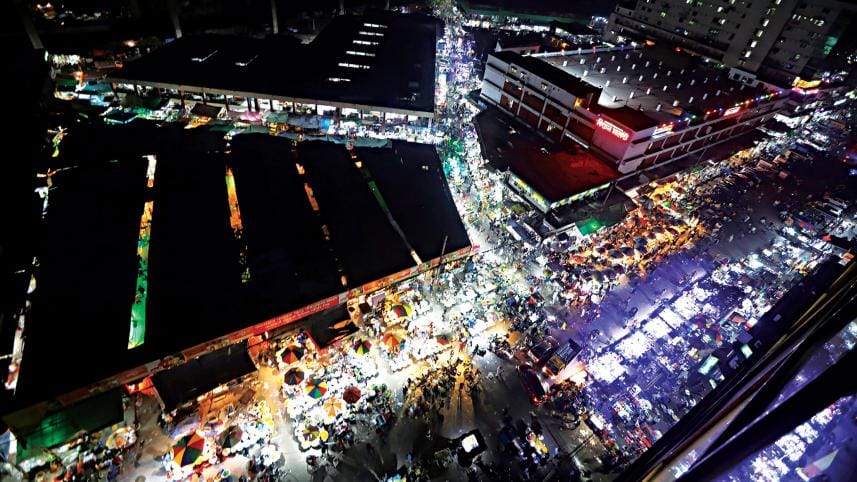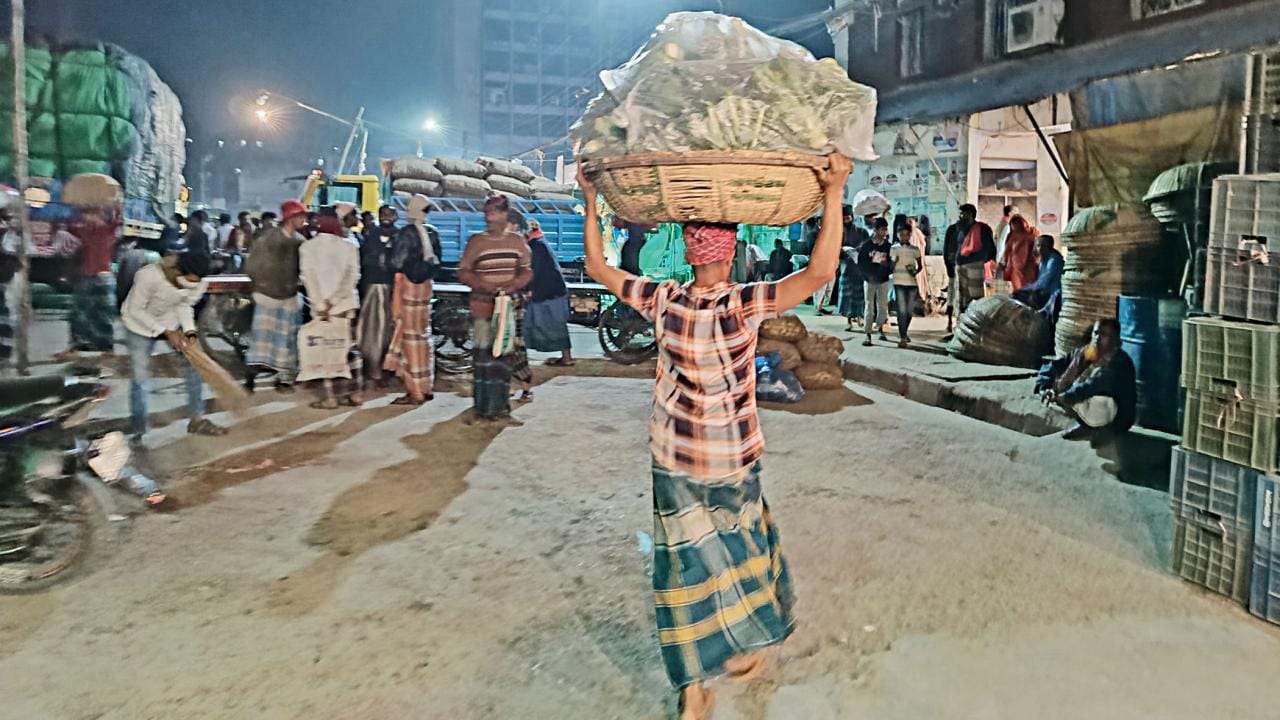Where night never sleeps and market is always open

As the night gets deeper and Dhaka goes to sleep, one place pulsates with energy -- Karwan Bazar kitchen market.
When the city's usual clamour softens, rivers of people -- buyers, sellers and transport workers alike -- gather here under the warm glow of shop lights.
Trucks laden with fresh produce rumble in, and their headlights illuminate scenes of tireless workers unloading mountains of vegetables, fruits, and spices. Rickshaw-vans, the swift steeds of this nocturnal market, weave through the throng, ferrying goods to their designated spots.
But the true magic lies in the human element. Porters, their muscles rippling beneath calloused skin, balance baskets (tukri) overflowing with goods on their heads. The sound of shopkeepers haggling with customers can be heard from far, adding to the vibrant atmosphere.
Everywhere you go, you'll see groups of labourers huddled around goods-laden trucks, their voices echoing in the night air.
This is Karwan Bazar at night, a world where sleep is a stranger and energy a constant.
The kitchen market resembles Dhaka's spirit, a representation of the city's never-ending hustle that binds its people together.
If you step into this vibrant bazaar, the sights, sounds, and smells will transport you to a world which never sleeps, and where the kitchen is always open.

WHAT TO EXPECT
During the day, retail products are sold in Karwan Bazar, Dhaka's central market. However, at night, it transforms into a bustling wholesale market supplying essential goods to the capital's residents.
At midnight, the market fills up with fruits, vegetables, fish, chicken, and more, with trucks unloading vegetables on the main road and fruits and rice near the Petrobangla building.
Then, the vans take goods to their designated places. The vans of the market are also unique as they do not have any chains, pedals, or bells; they are only used for wheel rolling.
In the vegetable market, when one sees the pile of pumpkins, it will appear to them like a mountain, with red spinach, gourd spinach, spinach, gourd, bitter gourd, carrot, tomato, banana, and everything else forming imposing mounds, arranged by the staff according to their size and quality.
Venture further and you'll encounter the fish market, where a dazzling array of fish, both local and foreign, converge. Their shimmering scales catch the dim light, creating a mesmerising spectacle that draws in buyers and sellers alike.
But the hustle and bustle doesn't stop there. Nestled within the market's lanes, the chicken market awaits, a hub where chickens, ducks, swans, turkeys, and pigeons exchange hands.

THE HUMANS OF KARWAN BAZAR
Atiqur Rahman supplies vegetables at least two days a week to Karwan Bazar. This has been his routine for the last seven years.
When there are no buyers in the suburban markets, farmers struggle to obtain fair prices for their goods. However, in Karwan Bazar, although prices may fluctuate slightly, there is no shortage of buyers, he said.
Hadisur Rahman, a wholesale buyer from Munshiganj, said Karwan Bazar is one of the most reliable places to get the kind of products that wholesale buyers demand.
"Besides, everything is available in the market. So, the market has become a place of trust for buyers like me," he said.
Stockist (Aratdar) Mohammad Ismail is one of them. Every day from 10:00pm to 8:00am, he engages in buying and selling goods, which is his routine. He forgoes sleep during these hours.
"Traders bring raw materials from different places and keep them in designated spots owned by different stockists. Wholesale traders buy their products from there, and the stockists get a commission for renting their spots," he said.
Traders who store their goods at their stalls are charged a 10 percent commission, or alternatively, they must pay Tk 3 for every 5kg of goods sold, he said.
He added that on average, a stockist gets a commission of Tk 2,500 to Tk 3,000 per night.
Traders buy goods and keep them outside by renting space. This is done by obtaining permission to use a certain amount of space and to ensure the security of goods. For this, they have to pay another Tk 40, he added.
"I can't remember when I last slept at night. Staying awake at night and sleeping during the day has become my routine," Ismail said.
He said his stall (arat) sells vegetables worth Tk 4-5 lakh each day, mostly sourced from Savar and Manikganj.
Like him, the lives of workers who transport the goods from the truck and deliver them to the shops in Karwan Bazar are also similar.

Thousands of workers work here at night. Those who transport goods in exchange for money don't have much to do during the day.
One such worker, Nurul Majid, said he sleeps during the day and goes out at night to work. On average, he earns Tk 450 to Tk 550 per night, he said.
WHEN THE NIGHT ENDS
As the first rays of dawn peek over Dhaka's horizon, the frenetic energy of the night market begins to ebb, the cacophony of voices gradually replaced by the quiet hum of counting machines. Traders, their faces etched with fatigue and satisfaction, tally the night's earnings, their stacks of taka a proof of the market's significance.
With the final coins counted and tucked away, the night market takes a well-deserved rest.
Stalls slowly dismantle, the goods give way to empty crates and swept-clean spaces. This brief lull signals the transition, the moment when the wholesale market of the night transforms into a retail market of the day.
Electronics, shoes, clothes, and wooden products are sold in the market during the day.
Karwan Bazar's dual identity, however, comes at a cost. Located in a prime location, the place contributes to Dhaka's infamous traffic woes, mostly during office hours.
The constant churn of trucks, rickshaws, and pedestrians creates a chaotic ballet, often leaving commuters and residents frustrated. Relocation proposals have swirled for years, suggesting new homes in Jatrabari and Aminbazar, but the shoppers, stubbornly rooted in tradition, resist change.
Meanwhile, Karwan Bazar continues its dance. Yet, the question lingers: can this legacy survive the challenges of a growing metropolis? Only time will tell if the market will adapt, or eventually face into a different kind of dawn.




 For all latest news, follow The Daily Star's Google News channel.
For all latest news, follow The Daily Star's Google News channel.
Comments